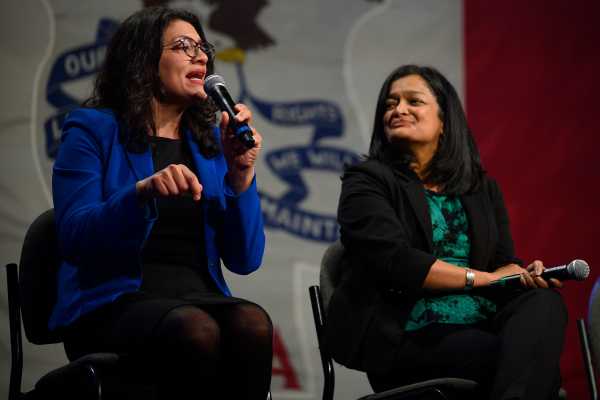
Michigan Rep. Rashida Tlaib has apologized for booing former Secretary of State Hillary Clinton Friday night over comments Clinton has made in recent weeks about Sen. Bernie Sanders, who Tlaib is a prominent campaign surrogate for.
“In this instance, I allowed my disappointment with Secretary Clinton’s latest comments about Senator Sanders and his supporters get the best of me,” Tlaib said Saturday on Twitter. “You all, my sisters-in-service on stage, and our movement deserve better.”
The comments, the booing, and the apology are merely the latest flare-up in a conflict that has been going on since the 2016 primary, one that sometimes makes it feel as if that contest will never end.
Despite choosing not to run in this year’s Democratic primary, Clinton has repeatedly offered her thoughts on Sanders, and her feelings about his 2016 campaign in recent months.
These comments have not been overly positive. Tensions between Clinton and Sanders supporters seemed to come to a head in January, following an interview Clinton gave to The Hollywood Reporter while promoting a Hulu documentary about her life and campaign.
Clinton was asked about a statement she makes in that film, in which she reportedly says that “nobody likes [Sanders], nobody wants to work with him” and that he’s a “career politician.” In the interview, she did not denounce these statements, and declined to say whether she would endorse Sanders should he eventually emerge as this year’s Democratic nominee.
Facing criticism, the former secretary clarified her comments in a tweet, writing “I will do whatever I can to support our nominee.”
However, Clinton again made headlines again Friday by offering more of her thoughts on Sanders, suggesting that he and his supporters could have worked harder to help her defeat president Donald Trump four years ago.
“All the way up until the end, a lot of people highly identified with his campaign were urging people to vote third party, urging people not to vote,” she said in an interview on the podcast Your Primary Playlist. “It had an impact.”
Friday evening, Sanders supporters gathered in Iowa for a Bon Iver concert in support of the candidate that featured a panel of three of the senator’s progressive surrogates, Reps. Tlaib, Ilhan Omar (D-MN), and Pramila Jayapal (D-WA).
Moderator Dionna Langford began to ask the representatives about Clinton, whose name drew boos from the audience.
Langford attempted to stop the crowd saying, “We’re not gonna boo, we’re not gonna boo. We’re classy here.”
But Tlaib disagreed, saying, “You all know I can’t be quiet. No, I’ll boo, we’re going to boo. The haters will shut up on Monday when we win.”
Facing criticism she was hurting party unity, Tlaib took to Twitter Saturday to offer an apology and a promise to do whatever she needs to do to defeat Trump in the fall.
A spokesperson for Clinton reportedly responded by pointing out Clinton won in Tlaib’s district:
As CNN’s Andrew Kaczynski points out, however, Sanders won Michigan’s Democratic primary, and the state went to Trump in the general election.
Tensions between the Clinton and Sanders campaigns remain a sore spot that won’t go away
Tensions between the Sanders and Clinton camps have remained high as the 2020 campaign has gotten underway in earnest, as explained by Vox’s Emily Stewart:
And as Tlaib’s response Friday shows, those raw emotions run through elected officials as well as grassroots supporters.
Tlaib, who endorsed Sanders in October last year, has always been particularly outspoken. She was roundly criticized in January last year when video emerged of her saying “impeach the motherfucker,” about Trump almost immediately after being sworn in as a congressperson.
And last July, a 2016 video of Tlaib protesting at a Trump rally went viral. In the video, a Trump supporter yelled at Tlaib to get a job. She, of course, went on to win the job of being an elected official.
The booing — and Tlaib’s apology — are a reminder of how enflamed passions are ahead of the first primary contests, and how much Democrats want to avoid the rifts that emerged between rival campaigns in 2016.
And though Tlaib’s apology is unlikely to settle the deep rift between the Sanders and Clinton camps, it could go a long way towards easing voter discomfort with party divisiveness as the candidates sprint for Monday’s Iowa caucuses. Particularly given voters have repeatedly expressed their desire above all else is to find a candidate capable of beating Trump this coming November that Democrats of all types will coalesce around.
A November Fox News poll of Nevada voters found 74 percent of likely caucusgoers said beating Trump is the most important thing in a candidate; 63 percent of Iowans told the Des Moines Register having a candidate who can beat Trump is more important than having one with policy positions they support. A national November Economist/YouGov poll found 65 percent of respondents said it’s more important to have a candidate who can beat Trump than one who aligns with their personal policies.
That desire suggests voters are paying attention to party unity, and are sensitive to anything that might suggest one candidate or another might destroy that unity before November. And part of that may require Sanders supporters to acknowledge that Clinton remains a popular figure in the Democratic party. A September Gallup poll indicated that 77 percent of Democrats view her favorably, numbers that beat out many of the candidates running in this year’s primary.
It is also true, however, that Clinton’s claim that “nobody likes” Sanders is inaccurate. According to a tracking poll from Morning Consult, he’s currently the most well-liked senator in the country.
Whoever emerges as the eventual nominee will have to unite the party’s progressive and more moderate party wings, while also appealing to independents in order to win this autumn. So far, the party has worked hard to squash disagreements quickly, like the argument Sen. Elizabeth Warren and Sanders had, or even Tlaib’s rapid apology. Whether the party can continue to do so — particularly given the leftover hard feelings from 2016 — will be one of the biggest questions for the general election.
Sourse: vox.com






